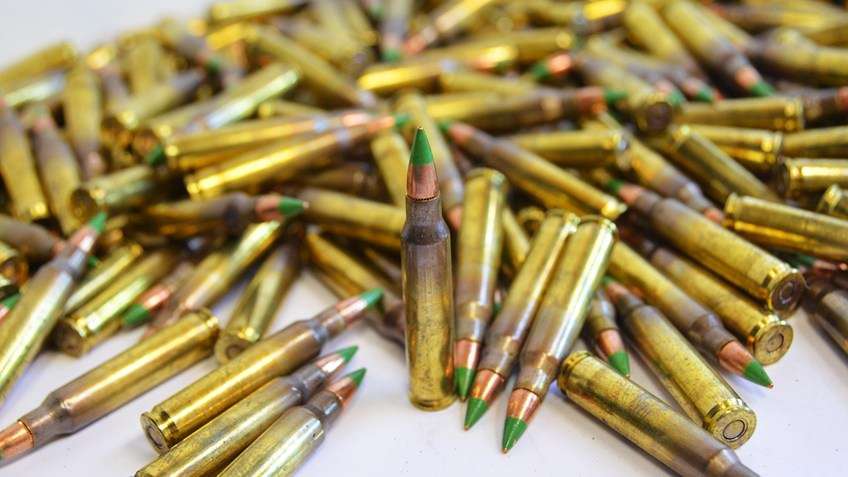ATF Tries to Ban Common Rifle Ammo As "Armor-Piercing" Despite Its Own Statutory Definition
Gun rights community sees a disturbing ongoing crackdown on common ammo availability via ATF fiat.
Frank Miniter at Forbes' website has a good summation of a controversial new move by the Bureau of Alcohol Tobacco and Firearms to ban further production and sale of some very common rifle ammo, by classifying it as "armor-piercing," something that, by statutory definition at least, it is not.

Excerpts:
The ATF says it wants to ban M855 ball ammunition, a .223 (or 5.56 mm) rifle bullet that has been used by American citizens for decades. The ATF says it wants to ban this popular bullet because it is "armor piercing."
The law at the basis of this debate is the Gun Control Act of 1968 (GCA). As amended, the GCA prohibits the import, manufacture and distribution of "armor piercing ammunition" as defined by a few terms Attorney General Eric Holder's Department of Justice (DOJ) is attempting to broaden.
The definition for what constitutes "armor piercing" reads: "a projectile or projectile core which may be used in a handgun and which is constructed entirely … from one or a combination of tungsten alloys, steel, iron, brass, bronze, beryllium copper, or depleted uranium."
Now, to be as nitpicky as the law, the M855 ball ammunition the ATF wants to ban as "armor piercing" doesn't have a core made of the metals listed in what legally makes a bullet "armor piercing." The M855 actually has a lead core with a steel tip. Also, the M855 is traditionally a rifle cartridge and the ban only covers handgun ammunition. The DOJ argues this doesn't stop them because the law stipulates they can ban a bullet that "may be used in a handgun." And, after all, any cartridge may be used in a handgun.
The ATF allows a "sporting exemption" for certain ammo that would otherwise be legally considered armor-piercing, but they claim because now weapons they consider more handgun than rifle can or are using the same ammo, that they are withdrawing that exemption for the M855.
ATF acknowledges so many citizens who thought they were being law-abiding have this ammo, so mere possession will not be illegal going forward if this becomes settled policy, but making, importing, or selling it will be verboten. (GunsSavesLives website calls the ammo "arguably" the second most popular for AR-15s in the U.S.)
The NRA's action page about these new regs, which are still open for public comment; the NRA tells you exactly how to make your voice heard in the process by March 16.
Bob Owens at the Bearing Arms site explains in further detail why M855 ammo is not, by ATF's own definition, bannable as "armor-piercing," mostly because it is mostly made of lead. Because of this, a careful reader could see the ATF's new proposed "framework" for armor-piercing to be directly contradicting itself. On page one, it says:
It is important to note that only projectiles that meet the statutory definition of "armor piercing" – i.e., those made out of the specific listed materials that may be used in a handgun – are subject to the statutory restrictions. As a result, manufacturers are, and will continue to be, free to manufacture projectiles from non-restricted materials, completely independent of the application of this framework or any exemptions.
Yet later, even though that seems to exclude M855s made mostly of lead, the directive declares:
Some ammunition that was previously exempted as "primarily intended to be used for sporting purposes," specifically 5.56mm constituent projectiles of SS109 and M855 cartridges, will again be regulated as "armor piercing ammunition." Except as provided by law, no person may manufacture or import such ammunition, and manufacturers or importers may not sell or deliver such ammunition.
Armor-piercing bullets are thus, by statutory definition, not made of lead, and ATF wants to control them more stringently moving forward, even ones they just want to declare armor-piercing despite being made of lead. At the same time, lead ammo is also a target of government bans on the state level. Hmm. Hard to use those guns without readily available ammunition.


Show Comments (210)